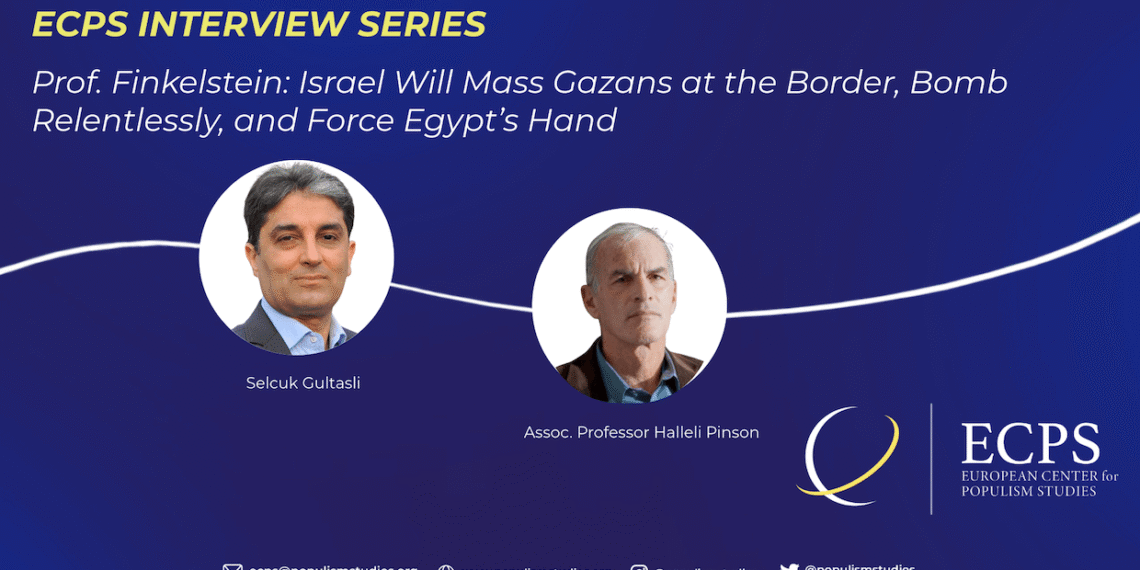Professor Norman Finkelstein—NYC-born to Holocaust-survivor parents and, in 2020, ranked the world’s fifth most influential political scientist—tells ECPS that “Israel will mass Gazans at the border, bomb relentlessly, and force Egypt’s hand.” Professor Finkelstein forecasts pressure on Cairo amid “images broadcast worldwide,” frames today’s war as a qualitative break aimed at depopulation (“stay and starve or leave”) and argues that “an imposed famine…constitutes clear proof of genocide.” He argues that, while procedural workarounds to a US veto exist at the UN, they are politically improbable in practice; hence he looks to EU trade leverage instead—though that, too, is stalled by a ‘lack of political will.’ Downplaying doctrinal debates over Zionism, he casts Israel as a ‘Jewish supremacist state’ analogous to apartheid-era South Africa, and notes collapsing Democratic support alongside generational GOP splits.”
Interview by Selcuk Gultasli
Giving an interview to the European Center for Populism Studies (ECPS), Professor Norman Finkelstein—born in New York City to Jewish Holocaust-survivor parents and, in 2020, named the fifth most influential political scientist in the world—states the core claim that frames this conversation: “Israel will mass Gazans at the border, bomb relentlessly, [and] force Egypt’s hand.”
The interview that follows situates Professor Finkelstein’s analysis within a stark forecast of prospective mass displacement. While he cautions that “I don’t think it’s easy to predict where this will lead,” he argues that Israel is “trying to amass the entire population of Gaza on the southern border,” after which “they will… begin bombing it relentlessly.” The intended effect, he suggests, is to compel Cairo under unbearable humanitarian pressure—“images broadcast worldwide… with desperate civilians screaming to be allowed into Egypt”—to open its frontier. Whether Egypt can resist that pressure, he adds, “I’m not sure.”
Professor Finkelstein frames the contemporary campaign as a qualitative break from earlier cycles of “mowings of the lawn.” The methods are not new, he says, but their magnitude is: destruction that once shocked humanitarian observers now approaches comprehensive urban pulverization. As to intent, he maintains that the objective is depopulation: “the people of Gaza will be given two choices—stay and starve or leave.” In his view, exterminatory violence functions as instrument as well as outcome—driven by “pure bloodlust,” by a desire to re-establish deterrence (“if the thought crosses your mind that there is a military option against us, just look at Gaza”), and by the aim to break both Gazan and international will.
On proof, Professor Finkelstein argues the evidentiary bar has already been met through rigorous humanitarian monitoring and legal dossiers. He points to a “voluminous documentary record,” including a South African memorial at the ICJ, and insists that “we’ve already reached the highest threshold of accuracy in documentation when it comes to Gaza.” For him, the decisive element is engineered deprivation: “an imposed famine—a human-made famine—constitutes clear proof of genocide.”
Institutionally, he sees impunity less in legal design than in political inertia. While acknowledging UN tools that can bypass a US Security Council veto, he judges them unlikely to be activated and locates leverage instead in Europe’s trade ties—frustrated, he says, by a “lack of political will.” In the domestic US arena, he notes collapsing Democratic grassroots support for Israel and a sharp generational split among Republicans, concluding that “it’s very difficult right now to defend Israel.”
Analytically, Professor Finkelstein downplays doctrinal debates about Zionism, preferring a structural diagnosis: Israel as a “Jewish supremacist state” enforcing regional dominance through periodic “mass death and destruction,” a pattern he analogizes to apartheid-era South Africa. Read against that backdrop, the title’s forecast is not a provocation but, in his account, a logical extension of means toward an end.


